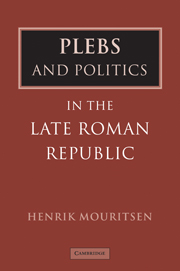4 - Legislative assemblies
Published online by Cambridge University Press: 22 September 2009
Summary
When the official debate, the suasio/dissuasio, drew to a close, the contio was dissolved and the comitia tributa or the concilium plebis was called. The assembled crowd was divided into tribus, and after a short prayer by the presiding magistrate, the successive voting of the tribus could begin. When a majority of tribus had accepted the proposal, it became law and binding for the entire Roman people. In this process it is tempting to see a direct democracy at work, as scholars have increasingly done in recent years. But while the system was no doubt direct, the question remains of how democratic the republican assemblies were in reality.
There were important formal limitations to the people's influence. Thus, in a ‘constitutional’ perspective the passive, ‘reflective’ role of the assembly is conspicuous. The comitia could only reject or approve proposals put before it by a magistrate. It could take no initiatives of its own nor suggest emendations or additions to bills. Moreover, the principle of corporate voting, though in itself not undemocratic, offered a perfect means of reconciling the principle of equal political rights with the elite's de facto domination of the political process. Without violating the formal political equality of Roman cives optimo iure this peculiar form of voting enabled the elite to give different weight to individual votes.
- Type
- Chapter
- Information
- Plebs and Politics in the Late Roman Republic , pp. 63 - 89Publisher: Cambridge University PressPrint publication year: 2001



